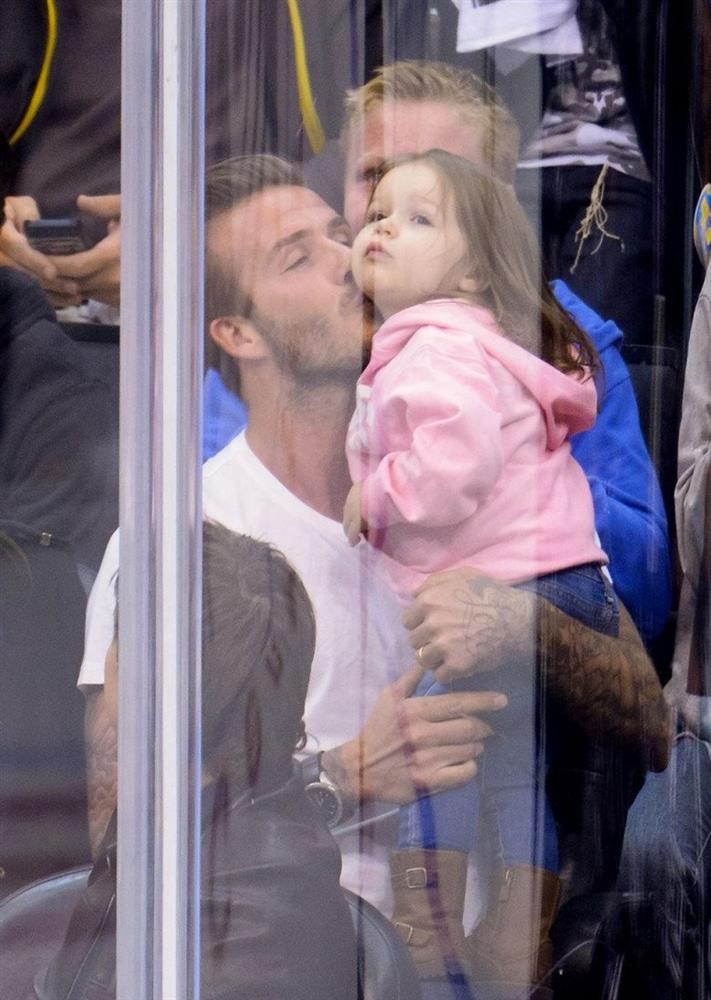Parental affection comes in many forms—some parents express love through hugs, others through gentle words of encouragement, and still others through physical closeness such as holding hands or cuddling. But one particular expression of affection, kissing a child on the lips, has stirred debate for years. For some, it is seen as a natural and tender way for a parent to bond with their child. For others, especially once a child grows older, it feels uncomfortable or inappropriate.
This ongoing conversation once again made headlines when global football icon David Beckham, one of the most recognizable athletes and celebrities in the world, faced widespread criticism after posting a photo of himself kissing his youngest daughter, Harper Seven Beckham, on the lips. What might have been an innocent family moment quickly ignited a firestorm of online commentary, sparking larger questions about cultural norms, parental boundaries, and the challenges of raising children in the spotlight.
The Controversial Photo
In 2021, when Harper turned ten, David Beckham shared a photograph of himself and his daughter enjoying a family moment. In the picture, the father and daughter kissed gently on the lips, something Beckham had done with his children since they were small.
But what seemed ordinary in the Beckham household became the subject of heated debate across the internet. Critics were quick to flood comment sections, accusing Beckham of overstepping boundaries as a parent. Some comments were harsh, even mocking:
-
“The girl is grown up now, it’s time to stop kissing her.”
-
“It’s terrible to kiss your daughter like that.”
-
“Are you going to keep kissing her until she has a boyfriend?”
-
“It looks really disgusting.”
Such remarks reflected the discomfort some people feel about lip-to-lip affection between parents and children, particularly as kids approach adolescence.

Supporters Defend Beckham
While criticism was loud, support was equally strong. Many parents—and even psychologists—pointed out that there is nothing inherently wrong with a parent kissing their child on the lips. For these supporters, Beckham was being unfairly targeted simply because of his fame.
Fans and fellow parents wrote comments such as:
-
“There’s nothing wrong with parents showing affection by kissing. It’s just love.”
-
“It’s wonderful to see such a close father-daughter relationship.”
-
“Don’t overthink it—David is simply being a loving dad.”
To them, the photo symbolized warmth, closeness, and the special bond between a father and daughter.
David Beckham Responds
David Beckham, never one to shy away from addressing public criticism, responded calmly but firmly. He explained that both he and his wife, Victoria Beckham, had always raised their children in a home filled with affection.
“I’m very affectionate with the kids, and that’s how Victoria and I were brought up,” Beckham shared in an interview.
“We want to show love to our children. My family is very loving, and that’s how we express ourselves.”
He also clarified that he kisses all of his children on the lips, except perhaps his eldest, Brooklyn, who was 18 at the time. “Brooklyn is grown now, so it might feel a little strange,” Beckham admitted with a laugh, acknowledging that as children grow into adulthood, expressions of affection naturally evolve.
Cultural Differences in Parenting
One reason the Beckham controversy drew so much attention is that opinions on kissing children vary widely depending on cultural, generational, and personal beliefs.
-
In some cultures, kissing children on the lips is entirely normal and continues well into adulthood. It is seen as a healthy way to show closeness.
-
In other societies, lip-kissing is considered an intimate gesture reserved only for romantic partners, making parent-to-child kisses feel inappropriate to some observers.
-
Generational shifts also play a role: older generations may view such affection differently from younger parents, who often embrace more open displays of love.
The Beckham family, being constantly in the public eye, became an unintentional case study of these cultural clashes.
Parenting in the Public Eye
The criticism Beckham faced also highlights the challenges celebrities experience when raising children under constant scrutiny. Every post, photo, and gesture is analyzed, debated, and sometimes judged harshly.
For Beckham, who has over 80 million followers on Instagram, even a simple family photo can become a global news story. Unlike ordinary parents, celebrities rarely enjoy the privacy to raise their children without outside commentary.
This reality creates pressure not only on Beckham but also on his children, who grow up knowing that their lives are constantly dissected by strangers online.
Psychological Perspectives
Experts in child psychology generally agree that kissing children on the lips is not harmful when done in a loving, family context. What matters more is the intention behind the act.
Dr. Charlotte Reznick, a child psychologist, once explained that parents should be mindful as children approach adolescence, since older children may develop different comfort levels with physical affection. However, she emphasized that in most cases, lip-kissing is simply a gesture of love.
Other professionals argue that the controversy says more about society than about the act itself. In cultures where affection is suppressed or overly sexualized, innocent expressions of love may be misunderstood.
Beckham as a Family Man
Beyond the debate, David Beckham has long been admired as a devoted father of four. Together with Victoria Beckham, he has raised Brooklyn, Romeo, Cruz, and Harper with a strong emphasis on family values, support, and love.
He frequently shares moments with his children, from attending soccer matches to cooking family meals and celebrating milestones together. Harper, the youngest, has often been described as “daddy’s girl,” with Beckham openly doting on her in public.
These displays of affection, including kisses, hugs, and hand-holding, reflect Beckham’s belief that children thrive when they feel secure and loved.
Public Reaction Over the Years
This was not the first time Beckham’s parenting style made headlines. Similar criticism surfaced in earlier years when he posted affectionate photos with Harper. Each time, the internet divided into two camps—those who celebrated him as a loving father, and those who accused him of crossing boundaries.
Despite the backlash, Beckham has remained consistent, refusing to change the way he interacts with his children simply to appease critics. This steadfastness has, in fact, earned him even more admiration among supporters who believe he is modeling healthy parenting.
The Bigger Question: How Should Parents Show Affection?
The Beckham incident raises a larger question that extends beyond celebrity culture: How should parents show affection to their children?
There is no universal answer. Some families are more reserved, showing love through acts of service or verbal affirmation. Others are physically affectionate, with frequent hugs and kisses.
What matters most, according to parenting experts, is that children feel loved, secure, and supported. Whether through kisses, hugs, or words, expressions of affection play a crucial role in a child’s emotional development.
Balancing Affection and Boundaries
Another key issue is the balance between parental affection and respect for a child’s comfort. As children grow older, they may develop different preferences regarding physical contact.
Good parenting, experts suggest, means being attentive to these changes. If a child feels uncomfortable with lip-kisses or public displays of affection, parents should adapt. Love is not diminished by changing how it is expressed—it is strengthened when it respects the child’s individuality.
In Beckham’s case, Harper has always appeared comfortable and close to her father, suggesting that the affection is mutual and welcomed.
Social Media and Parenting Controversies
In today’s digital age, parenting decisions that were once private are now subject to public judgment. Social media has created a culture where personal family moments can go viral, attracting both praise and criticism.
For celebrities like Beckham, every post has the potential to spark debate. Some argue that sharing such moments invites unnecessary scrutiny, while others believe it helps normalize affectionate parenting.
This dynamic reflects broader societal tensions about privacy, celebrity culture, and the role of social media in shaping public opinion.
Conclusion: A Kiss That Sparked a Conversation
David Beckham’s kiss with his daughter Harper may have divided opinion, but it also opened up a valuable conversation about parenting, affection, and cultural norms.
For some, the kiss was inappropriate. For others, it was a heartwarming reminder that love between parent and child should never be judged. What is clear is that Beckham remains unapologetic in his role as a loving father, choosing to prioritize his children’s sense of security and affection over the noise of online criticism.
In the end, perhaps the lesson is this: parenting looks different in every family. What matters most is not how love is shown, but that it is present, consistent, and unconditional.
And for David Beckham, that love—whether through kisses, hugs, or shared moments—remains at the heart of his identity as both a global icon and, more importantly, a father.
